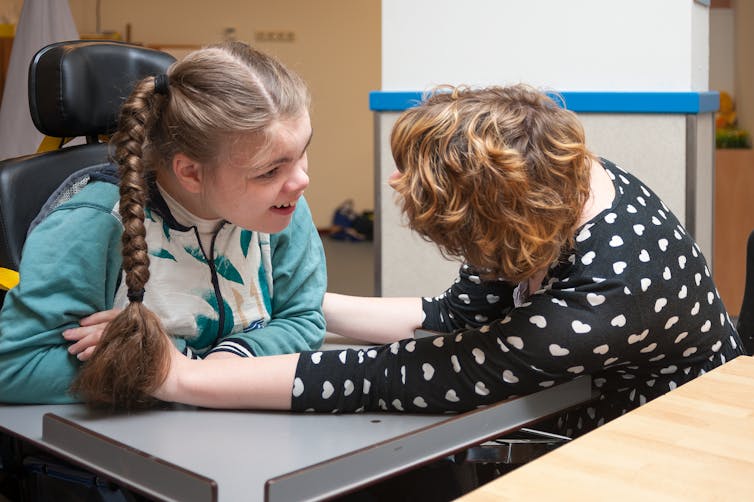Almost three years into the pandemic, the UK’s 10.6 million informal carers face an uphill struggle. If the cost of living crisis is a concern for everyone, for those providing some level of primary care for a family member or friend it is financially and emotionally crippling. This was most keenly demonstrated by a woman in Tayside, Scotland, facing a £17,000 energy bill to keep her disabled child alive.
When COVID hit in March 2020 and the “clap for our carers” movement was initiated by Annemarie Plas, a Dutch yoga teacher living in London, to recognise the heroic efforts of NHS staff, care workers and key workers. Informal carers were not mentioned.
Between May 2020 and February 2021, we conducted in-depth interviews (on Zoom or over the phone) with 13 parent-carers to find out how they were experiencing care support and services during lockdown. We found that many feel undervalued and mistreated.

How care work is undervalued
While most of our participants were supportive of the push to acknowledge key workers, there was a shared feeling across all participants in our study that they were not included. As one interviewee, Annalise (pseudonyms are used throughout to ensure confidentiality), put it: “The clap for carers was not for us, we weren’t even mentioned. It’s upsetting because again it’s like we are invisible.”
This sense of invisibility feeds into the wider social stigma our interviewees brought up, surrounding benefits in the UK. Some parent-carers and other informal carers feel as though people think of them as non-contributors to society. As Eleanor described it:
People will ask, “Do you work?”. And I will say I am a full-time carer. And they’ll say, “Yeah, but do you work?” Yeah, I do work, bloody hard, you know, with no breaks, no paid holidays. I am a parent-carer, but I want to be recognised as a worker. The label means people do not think you work; they think I just care for my daughter.
This sentiment was echoed by Tina:
I am worth less than somebody who has no intention of ever working in their lives. It makes me feel like benefit scum and that’s how social services talk to you.
The government’s carer allowance stipulates that if you work as a carer for more than 35 hours a week, you will receive £69.70 a week before tax. This works out to £1.93 per hour. If you’re providing full-time care, which many of the people we spoke to do, you’re being paid even less: £9.60 a day or £0.40 an hour.
This dramatically undervalues the work carried out. Many of our interviewees undertake highly complex medicalised treatment, such as dialysis at home, tube feeding and administering complex drug regimens, both day and night.
And the full-time nature of the job means that working alongside it is often impossible. Eleanor explained that looking after her daughter full-time means she is forced to live on that allowance:
I can’t work because of Clare. If she’s not in school, who has her? Who will give me time off a job if Clare is not well? The government won’t pay for respite for you to work. So, as a parent-carer it is not really possible to have a life, you know. I can’t and never will retire.
Tina, another respondent, described how she had to quit her job when working and caring for her child became impossible:
For the most part, something snaps or gives, or you’ve compromised your health. I got to my sixth day without sleep and working night shifts around Penny, and I realised this is not tenable. I handed my notice in and I didn’t tell anyone for a week, because I felt like I should still be working. I still feel like that to be honest. I know I am working but it is not considered, it is not valued.
The problematic label of parent-carer
Our research revealed the term of parent-carer, which is widely used in society, to be problematic. Underpinning that label is the assumption that all parents will care for their child, regardless of the care involved. The labour they undertake is masked because they are described as a parent first and a carer second.
This belies the level of professionalism, expertise and labour required to undertake around-the-clock care that exceeds standard parental tasks. This was further exacerbated during the pandemic when essential care services were curtailed. One interviewee, Diana, said:
Due to COVID and lockdown, I’ve gone from being a carer to being a carer, a physiotherapist, a teacher, a dietician – literally, everything under one umbrella and all without any guidance.
Our research revealed how government bodies and social services often use the rhetoric of parental responsibility. In emphasising the parental role, they devalue the extensive and valuable care parent-carers offer to society.
In her 2022 book The Care Crisis, sociologist Emma Dowling describes this rhetorical sleight of hand as a “care fix, whereby the crisis of care permeating the UK is not resolved but merely displaced”. By this, she refers to how the responsibility for care has at times been shifted from the medical and social sectors to the home and the individual caregivers within. Dowling contends that this allows authorities to “offload the cost of care to unpaid sectors of society”.
More than two-thirds of carers are unable to meet their monthly expenses, while almost a quarter are relying on food banks to survive. The question, then, is how long this “care fix” can last, especially when people are faced with the dilemma of heating their homes and eating or running the equipment that keeps their loved ones alive.
The authors do not work for, consult, own shares in or receive funding from any company or organization that would benefit from this article, and have disclosed no relevant affiliations beyond their academic appointment.
This article was originally published on The Conversation. Read the original article.







